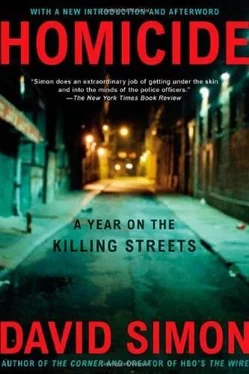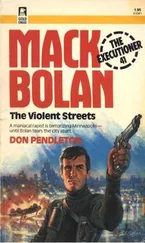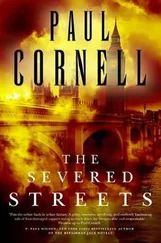“That’s a nine-millimeter?”
“Either that or a three-eighty. I saw an ad for one of these bad boys in the FBI magazine.”
“Uh-huh,” says Eddie Brown, giving the gun a last look. “She does look nice.”
It is daylight now, a little before six on a day that promises to be hot. In addition to having been the proud owner of a 9mm Colt replica, the dead man is a twenty-two-year-old east-sider with a thin, athletic frame. The corpse has already got a decent rigor to it, with the lone gunshot wound visible at the top of the head.
“Like he was duckin’ down and didn’t get low enough,” says Eddie Brown, a little bored.
A crowd has already gathered at both ends of the courtyard, and though a canvass of the neighboring rowhouses will produce not a single witness, half the neighborhood seems to be out bright and early for a glimpse of the body. Within hours there will be four anonymous calls-“I want to remain monogamous,” one caller will insist-as well as a report from one of Harry Edgerton’s paid informants on the east side. Together they will provide a full chronicle of the death of Clayvon Jones. Classify it as scenario number 34 in the catalogue of life-and-death ghetto drama: an argument between two dopers over a girl; a fistfight in the street; threats back and forth; young kid paid in cocaine to go shoot Clayvon in the head.
To Dave Brown’s amusement, three of the callers will insist that the shooter placed a white flower on Clayvon’s mouth after the murder. The flower, Brown will realize, was nothing more than the foam at the corners of the dead man’s mouth, which was undoubtedly visible to the crowd that greeted the detectives on their arrival at the scene.
At this moment, however, all of that is still to come. At this moment, Clayvon Jones is simply a dead yo with a quality weapon he never got to use. No witnesses, no motive, no suspects-the standard whodunit mantra.
“Hey, guy.”
Dave Brown turns around to see a familiar face on one of the Eastern uniforms. Martini, isn’t that it? Yeah, the kid who took a bullet for the company in a drug raid at the Perkins Homes last year. Good man, Martini.
“Hey, how you doing, bunk?”
“Okay,” says Martini, pointing to another uniform. “My buddy here needs a sequence number for his report.”
“You’re Detective Brown, right?” asks the other uniform.
“We both be Detective Brown,” says Dave Brown, wrapping his arm around Eddie Brown’s shoulder. “This here’s my daddy.”
Eddie Brown smiles, his gold tooth shining in the morning sun. Smiling back, the uniform takes in the salt-and-pepper family portrait.
“He looks like me, don’t he?” says Eddie Brown.
“A little bit,” says the uniform, laughing now. “What’s your sequence?”
“B as in boy, nine-six-nine.”
The patrolman nods and steps away as the ME’s van pulls to the edge of the courtyard.
“We done here?” asks Dave Brown.
Eddie Brown nods.
“Okay,” says Dave Brown, walking back toward the Cavalier. “But we can’t forget the most important thing about this case.”
“What’s that?” says Eddie Brown, following.
“The most important thing about this case is that when we left the office, the Big Man told us to bring him back an egg sandwich.”
“Oh yeah.”
Back in the homicide unit’s coffee room. Donald Worden waits for his sandwich in a cloud of Backwoods cigar smoke, nursing a rage that has been his for a week and a half. He does this silently, stoically, but with such energy and determination that no other man dares approach him with so much as a platitude during the morning shift change.
And what, in truth, can anyone really say? What do you tell a man who has tailored a career to his own sense of honor, his own code, when that honor is being bartered back and forth by politicians? What do you say to a man for whom institutional loyalty is a way of life when the police department in which he has spent twenty-five years is now offering fresh lessons in betrayal?
Three weeks ago, the brass had gone first to Rich Garvey. They went to him with a 24-hour report and some notes and a manila folder without a name or case number. State senator, they explain. Threats. Mysterious assailants. A possible abduction.
Garvey listened patiently. Then he looked at the initial report from two detectives on Stanton’s shift. It was not pretty.
“Just one question,” asked Garvey. “Can I polygraph the senator?”
No, the supervisors told themselves, perhaps Rich Garvey isn’t the best man for this case. They excused themselves quickly, taking the report and the manila folder to Worden.
The Big Man let them talk, then arrayed the facts in his mind: State senator Larry Young. A Democrat from West Baltimore’s 39th legislative district. A product of the Mitchell family’s west side political machine and the chairman of the General Assembly’s influential House Environmental Matters Committee. A leader of the Black Legislative Caucus with ties to City Hall as well as some of the police department’s ranking blacks. A forty-two-year-old bachelor living alone on McCulloh Street.
That much made sense, the rest was bizarre. Senator Young had called a friend, a highly respected black physician, and told of being abducted by three men. He had been leaving McCulloh Street alone and they had a van, he explained. He was forced inside, blindfolded, threatened. Stay away from Michael and his fiancée, they told him, referring to a longtime political aide who was planning to marry. Then these unnamed assailants dumped him out of the rear doors, up near Druid Hill Park. He had hitched a ride back home.
Outrageous, the friend had told him. You have to call the police. No need, Larry Young assured him. Why involve the police department? I can deal with this on my own but I just wanted to tell you about it, he explained to the friend, who nonetheless remained insistent, arranging for a conference call with Eddie Woods, the deputy commissioner for services and a political ally of the senator. Deputy Woods listened to the tale, then rightly insisted that an abduction of a state senator had to be investigated. Homicide was called.
“Will you take it?” they asked again.
Worden calculated the unspoken facts: powerful legislator, powerful friends. A reluctance to report a crime. A ridiculous story. Nervous bosses. The selection of an aging white homicide detective, a cop with a clean performance sheet and enough time on to take a pension should the thing get nasty.
Okay, Worden told them. I’ll eat it.
After all, someone had to take the file, and Worden reasoned that a younger man would have more to lose. The detectives on Stanton’s shift who originally took the call wanted nothing whatsoever to do with it. Nor was Garvey looking to lean into any punches. But what could they do to Worden? It made sense, and yet when Worden talked like that it sounded as though he was trying to convince himself more than anyone else.
Closer to the point, Worden was truly the product of the department’s old school: Give him an assignment and he works it. And if some believed that loyalty to command had burned Worden in the Monroe Street investigation, everyone understood that he would never duck a request from a superior even if it meant getting burned again.
With Rick James in tow, Worden went first to the home of the political aide in Northeast Baltimore, where he spoke with the aide’s parents, a gracious, elderly couple fairly mystified at their playing host to a homicide detective. They told Worden that they knew nothing about any abduction. In fact, earlier on the evening of the alleged incident, the senator had come by the house to visit their son, who had not been home at the time. Mr. Young waited, chatting amiably with the couple, until their son returned. Then the two younger men walked out the back door and into the yard to discuss a private matter. A short time later, their son came back into the house without the senator, who had left. Then their son said he had hurt his arm and needed a lift to the emergency room.
Читать дальше












